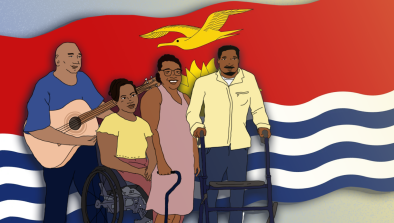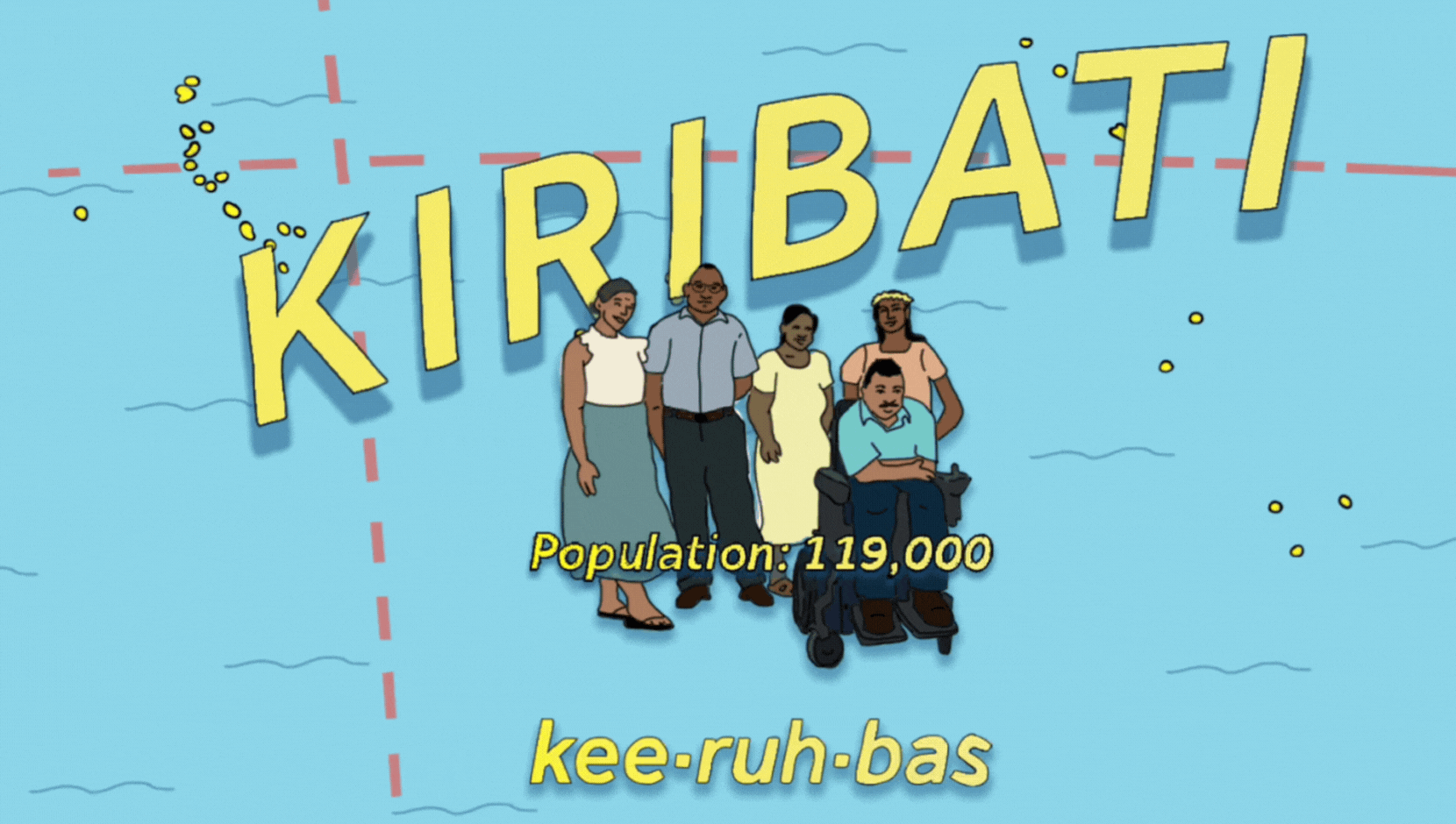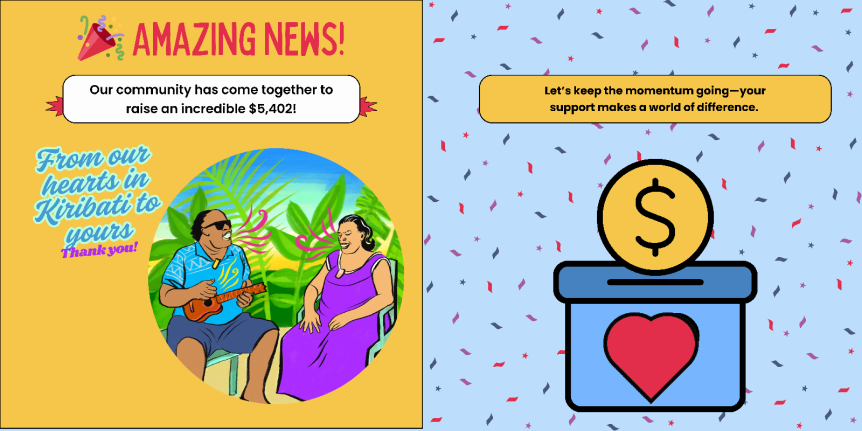A project of the Unitarian Universalist Service Committee
Preserving Culture and Community in the Face of the Climate Crisis (Part 1)
When the seas rise, it’s not just homes at risk; entire cultures and histories face disappearance.
Advancing Non-Economic Loss and Damage Solutions Across the Pacific
With a shared commitment to decolonized grantmaking and Indigenous self-determination, UUSC and its partners are fostering inclusive strategies to preserve cultural heritage, promote gender equity, and build resilient futures.
Banaban Human Rights Defenders Network (BHRDN)
Ecological Solutions Foundation Trust Board
Fiji Women’s Rights Movement
Kiribati (Rabi Island)
Solomon Islands
Fiji (Koro Island)
Kioa Island Community Organization (KICO)
Kiribati Climate Action Network (KIRICAN)
Jo-Jikum
Fiji (Kioa Island)
Marshall Islands
Kiribati (Banaba Island)
Tuvalu Climate Action Network (TuCAN)
Te Toa Matoa
Tulele Peisa
Kiribati
Papua New Guinea
Tuvalu
Non-Economic Loss and Damage (NELD) is an often overlooked aspect of the climate crisis, yet it is crucial for understanding the experience of directly impacted communities. NELD is the intangible losses that cannot be measured solely in monetary terms—such as the loss of cultural sites, traditional practices, languages, and collective identity. These non-economic damages affect people's well-being, dignity, and resilience worldwide.
UUSC, in partnership with the Climate Justice Resilience Fund and the Scottish government, has taken significant steps to address NELD by distributing funds to frontline organizations. This collaboration reassures us that we are on the right path to preserve cultural heritage and promote collective decision-making in the face of climate change.
We often think about climate change in terms of commerce, but what about community? Why do we prioritize buildings and bridges over tradition and culture? Traditional knowledge is just as valuable as the roads we travel.
People of conscience have a moral imperative: To look beyond the confines of capitalism and cash and into the roots of creation, the intangible aspects of our lives that make our communities what they are. Each of the following partners seeks to remember and maintain the building blocks of tradition, history, and customs that bind us together.
Tuvalu Climate Action Network (TuCAN)
Fiji Women’s Rights Movement
Kioa Island Community Organization (KICO)
Tuvalu: Crafting Culture by Hand
Frightening Fact: Tuvalu—a small Pacific Island halfway between Hawaii and Australia—is expected to have 95% of its land mass inundated by water due to high tides, effectively wiping the nation off the map. But there’s more to this story than just buildings, roads, bridges, and businesses. The island has a rich language with two national dialects, a culture deeply rooted in community, and a history that goes back to the 13th Century.
The Tuvalu Climate Action Network (TuCAN) addresses NELD by supporting Tuvaluan women’s traditional handicraft-making practices. By providing modern tools and training, TuCAN reduces physical strain, improves health outcomes, and empowers women to preserve their cultural traditions while remaining financially self-reliant. Younger generations will learn these skills, raising awareness about the broader non-economic losses associated with climate change, particularly the loss of practices deeply tied to Tuvaluan identity.
Fiji: Shaping the Future Through Preserving the Past
Fiji, nestled in the South Pacific’s Melansian region, is a diverse cultural landscape of over 300 islands, where Polynesian, Melanesian, and South Asian communities have settled their roots. With a history dating back 3,500 years, close-knit villages have developed a mutual relationship of care with land and sea all while thriving in lush rainforests, coral reefs, and expansive coastlines. Coping and adapting to immediate climate and colonial disruptions is a common reality for many Fijians, having gained independence from Britain in 1970; yet the resilience of people continues to grow and evolve. Despite being at the forefront of the global climate crisis Fiji is proud to have preserved rich traditions through storytelling, craftsmanship, and communal rituals that bind villages together.
On Fiji’s Koro Island, where displaced villages are still recovering from a catastrophic 2016 cyclone, Fiji Women’s Rights Movement, in partnership with Climate Tok, is leading efforts to compile and build an inventory of Indigenous knowledge. Through a community-wide “Koro Study" and gatherings with frontline “climate champions,” women and elders will have a voice in shaping their communities’ future by looking back and documenting history. This gender-inclusive initiative will secure Koro’s residents environmental wisdom and allow for practices that have sustained their communities for generations to be protected and shared. From agricultural practices to vital protocols around conserving natural resources, these preserved conversations will enrich Koro’s collective resilience and fortify an Indigenous legacy that no cyclone can destroy.
Fiji: Reviving Traditional Healing and Ecological Knowledge
In the heart of Fiji’s Kioa Island, under the shade of ancient trees, a powerful tradition of healing and resilience pulses through the island. Kioa Island Community Organization (KICO) is leading an effort to breathe new life into Tuvalian traditions, such as carvings and ceremonial songs, and nurturing Kioa’s cultural heartbeat so it won’t be lost to time. The art of weaving, for example, is far more than just craft; it is a sacred act that embodies familial stories and environmental stewardship. By centering and connecting elderly women and youth, KICO is fostering collective identity and resilience that endures despite ongoing climate threats. Self-determination is key for the people of Kioa Island as they hold on to their roots and find a path forward with strength.
In part two of our series, we’ll explore three more UUSC partners, and their efforts to memorialize culture, tradition, and wisdom in the face of radical climate change impacts threatening to swallow entire islands.
A project of the Unitarian Universalist Service Committee
Preserving Culture and Community in the Face of the Climate Crisis (Part 2)
In part two of this series, we delve into three small organizations tremendously impacting their communities.
Imagine a community where the rhythm of life has been guided by water for generations, where the sea isn’t just a backdrop but a lifeline. For centuries, communities across the Solomon Islands and Kiribati have cultivated livelihoods deeply connected to the unique landscapes of their islands, adapting to their surroundings while preserving cultural traditions. But now, as rising waters swallow coastlines and destroy landscapes, people are forced to address an urgent question: How do you preserve a place you call home when it is disappearing? Separated by more than 1,100 miles, the Solomon Islands and Kiribati still share vital climate change obstacles that bind their struggles.
Living with a fierce commitment to addressing the challenges of climate change, we will learn about three communities and how they adapt to address their community needs in terms of non-economic loss and damage. While striving to maintain their core identity, people are evolving with transformative actions in response to disturbances and the looming threat of losing tradition. For many with a deep connection to their geography, the trauma experienced from being disconnected to ancestral land is felt deeply. Financial sustainability is important; however, memories and traditional knowledge are irreplaceable.
Ecological Solutions Foundation Trust Board
Kiribati Climate Action Network
Te Toa Matoa
The Solomon Islands: Surviving Rising Seas, Thriving in Community
The Solomon Islands—situated over 1,300 miles northwest of Fiji,—is a nation of more than 900 islands with a population of 815,000, each island with its own unique culture. For centuries, the people of the Solomon Islands have coexisted with nature by building stilt houses, fishing, and farming fertile land. However, given that 80% of the population lives in low-lying coastal areas, frequent storm surges and king tides threaten the stability of future generations. According to the 2021 World Risk Report, the Solomon Islands is currently the second-most at-risk nation for natural disasters.
Through photography and film, the Ecological Solutions Foundation Trust Board (ESFTB) documents the experiences of those whose lives have been uprooted, ensuring their histories are seen and voices are heard. This initiative highlights the non-economic losses experienced by communities as their lands and traditions are threatened by rising sea levels and environmental degradation. By preserving these stories, ESFTB fosters a sense of connection and shared responsibility—both within the islands and beyond—and instills within us an urgent responsibility for protecting the environment.
Kiribati: Cultural Pride Surpassing High Tides
Have you heard of Kiribati? It’s a culturally rich island nation that 120,000 people call home. The nation is north of New Zealand and southwest of Hawaii. The people of Kiribati have a saying: “Te raoi,” which means “peace and harmony.” Yet, their way of life is increasingly at risk as climate change makes it difficult to grow vegetables and find safe drinking water. NASA predicts that Kiribati’s sea level could rise by more than three feet and—depending on the intensity of global warming—could even reach six-and-a-half feet.
Despite these obstacles, Te Toa Matoa, an organization led by and for people with disabilities, is determined to maintain the community spirit. By channeling the power of music and including people with disabilities as active participants, they are committed to long-held cultural practices that remain vibrant through traditional song and dance. Te Toa Matoa is launching a YouTube channel to create a digital, accessible archive of music videos that highlight the connection between climate impacts and cultural preservation. This project isn’t just about entertainment; it's about leveraging art to give a platform for those often left unheard. Furthermore, Te Toa Matoa will continue to collaborate with local government agencies to advocate for inclusive policies and provide community-oriented disaster relief training to support individuals with disabilities during crises. By embracing inclusivity and cultural pride, Te Toa Matoa wants to continue fostering resilience, even as the seas rise.
Banaba Island: Supporting Women Through Traditional Food Preservation
On the western edge of Kiribati lies Banaba Island, a locale with a complex history shaped by colonialism and phosphate mining. Kiribati, composed of 33 atolls and reef islands, is one of the world’s most remote and low-lying countries. Despite decades of exploitation and displacement due to resource extraction, the Banaban people strive for a flourishing community. Today, the Kiribati Climate Action Network (KIRICAN) collaborates with Banaban women to revive and promote traditional food preservation techniques passed down for generations. KIRICAN's efforts address food insecurity and foster economic independence by reclaiming the traditions and knowledge that have sustained the island for centuries. Women are taking on leadership roles, actively working to secure their community’s future and preserve their cultural heritage—one crop at a time.
And you can help. Currently, the members of Te Toa Matoa are fighting for their livelihoods and the future of the organization



In the final part of the series, we visit three more UUSC partners—all working towards the goal of resilience, preservation, and evolution.
A project of the Unitarian Universalist Service Committee
Preserving Culture and Community in the Face of the Climate Crisis (Part 3)
In the final installment of this three-part series, we’re introduced to three small—but mighty—groups prioritizing people over possessions in the face of the global climate crisis.
In the remote islands of the Pacific, where stars have guided communities for centuries, and ancestral stories are passed down like heirlooms, the fight for survival has never been more urgent. Today, these island nations are confronting rising seas and the slow disappearance of their cultural landscapes. How do you hold on to the songs, the dances, and the collective wisdom that have shaped identities when your homeland is at risk of being lost to the sea?
Now, we meet three more partners transforming adversity into action through addressing the impacts of non-economic loss and damage. They are planting mangroves to shield coastlines, training women and youth to lead, and reviving traditions that nurture the spirit and the land. Their work shows us that resilience is more than just surviving; it's about honoring and evolving the fabric of culture. Together their stories remind us that while the islands may be small, their future remains a powerful promise.
Banaban Human Rights Defenders Network (BHRDN)
Jo-Jikum
Tulele Peisa
Rabi Island: Reviving Heritage Through Resilience
Kiribati’s Rabi Island serves as a sanctuary for the Banaban people, who were displaced from their ancestral homeland. Originally uninhabited, Rabi was purchased in 1942 by the British government as a refuge for those displaced by phosphate mining. Despite the ongoing impacts of climate change, communities are focused on restoring the island’s natural environment and are committed to cultural preservation. Those on the island want to rebuild a life honoring their roots despite being far from their native island.
The Banaban Human Rights Defenders Network (BHRDN) is leading the Banaban Heritage Revival and Climate Resilience Project, focusing on preserving Banaban culture, language, and traditional handicrafts while promoting gender equity. Through reforestation and mangrove replanting initiatives, BHRDN wants to fortify the sense of belonging for those on the islands. Mangroves are more than just coastal protectors; they are integral to Banaban life, providing resources for traditional medicine. BRHDN is strengthening Rabi Island as a beacon of heritage and hope for future generations by engaging women and girls in decision-making processes for environmental projects like this.
The Marshall Islands: Passing Down Knowledge Through Youth Engagement
Jo-Jikum, based in the Marshall Islands, engages youth as essential for preserving cultural heritage. The Marshall Islands, a chain of stunning carol atolls between Hawaii and the Philippines, has long been a symbol of resilience. For generations, Marshallese communities have navigated foreign occupation, nuclear testing, and now, the existential threat of climate change. In a recent effort to raise awareness and honor its history, Jo-Jikum, with UUSC, hosted, “From Horror to Healing: Nuclear Victims Remembrance Day and the United States,” an art event highlighting the impact of U.S. nuclear testing on the island’s people.
Through programs like the Ridge to Reef Resources program and the Legendary Landmarks project, Jo-Jikum offers workshops connecting Marshallese youth to their ancestral knowledge while equipping them with skills to address contemporary challenges. These initiatives teach youth about the intersections of climate change, health, and history while safeguarding critical cultural landmarks and legends. By fostering youth leadership, Jo-Jikum creates a bridge between past and future, weaving together the islands’ history of resilience with a vision of sustainability for future generations.
Papua New Guinea: Ancestral Knowledge is Key for the Future
Tulele Peisa goes beyond the challenges of relationships; it’s a movement to preserve the soul and heritage of Papua New Guinea, a country in the southwest Pacific Ocean and just north of Australia. As a nation celebrated for its incredible cultural diversity, with over 800 languages spoken across its landscape, now more than ever, it's essential to transfer knowledge and skills to the next generation. To respond to imminent climate threats, local chiefs and elders spearhead new and exciting initiatives to ensure the next generation is empowered. One such initiative focuses on the traditional craft of canoe-making, a practice that not only facilitates transportation but also serves as a cultural bridge for deep bonds built during festivals and gatherings. By engaging youth ages seven to 35, these efforts foster a sense of identity and purpose in an ever-changing environment.
However, Tulele Peisa’s mission extends beyond the physical skills for vital survival. They recognize the critical role of women in maintaining cultural traditions woven into the island's society. Safe spaces have been created for elder women to share the artistry behind creating Beruana and Kulil—traditional jewelry with significant cultural value tied to ceremonial events and community exchange. Elder women share techniques with youth through workshops and intergenerational dialogues, ensuring artistic practices and heritage are not lost. Through this work, Tulele Peisa upholds the values that have sustained Papua New Guinea’s people for centuries, making sure they remain vibrant in changing climates.
Through its partnerships, UUSC advocates the preservation of life and the human rights that come with it, but also the survival of the traditions, stories, and wisdom that have shaped generations. As these communities confront the realities of a changing climate, their efforts remind us that protecting cultural traditions is both an act of resistance and a declaration of identity. Today's work promises the next generation that they will inherit a world where their cultural legacies are not just remembered but powerful symbols of unity. Not only this, the work of these nine partners weaves together so many critical areas of justice: climate, gender equity, anti-colonialism, youth activism, and Indigenous sovereignty and self-determination (to name just a few!).
We must reflect on what we truly value in a rapidly evolving world. Are we willing to sacrifice the core values that define us for economic gain, or will we commit to preserving the lessons of our ancestors? The choices we make now will shape the world we leave behind. Our partners' efforts illustrate the strong spirit of community solidarity—a spirit that endures despite the ever-rising tides.
Created by the Unitarian Universalist Service Committee
Illustrations by Micah Bazant